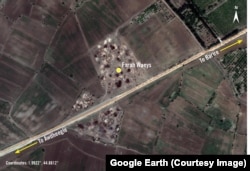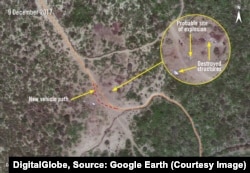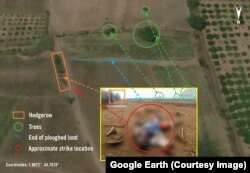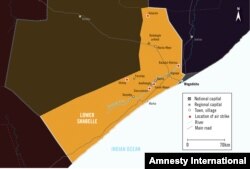A human rights group says 14 civilians were killed during five U.S. airstrikes in Somalia in the last two years, an allegation the U.S. military strongly denies.
Amnesty International issued a civilian casualty report Tuesday, which included accounts from 65 eyewitness interviews, several photos, satellite imagery and social media posts as evidence of airstrikes in Somalia's Lower Shabelle region from October 2017 to December 2018.
The rights group concludes that its report "provides credible evidence that U.S. airstrikes were responsible for four of these incidents and that the fifth was most plausibly caused by a U.S. airstrike."
U.S. Africa Command (AFRICOM), which conducts U.S. military strikes in Somalia in coordination with the Somali government, asserted that no civilians have been killed in its strikes and said Amnesty's report "does not accurately reflect AFRICOM's record in mitigating civilian casualties."
"AFRICOM goes to extraordinary lengths to reduce the likelihood of civilian casualties, exercising restraint as a matter of policy," it said.
The rights group presented 13 allegations to the command in October 2018 and February 2019, five of which were detailed in its report. Amnesty's Conor Fortune told VOA Tuesday that the other allegations lacked "sufficient corroborating evidence" or were disregarded by the rights group based on "untrustworthy" sources.
According to defense officials, the U.S. military has assessed 18 allegations of civilian casualties in Somalia since 2017, allegations that were received from its own internal examination of strikes or from outside allegations.
Post-strike analysis "using intelligence methods not available to nonmilitary organizations" found that none of those airstrikes resulted in any civilian casualty or injury, a defense official said.
The official added that AFRICOM did not even conduct a strike at the time and place of one of the five allegations presented in the report.
"I'm confident that our procedures would permit us to do thorough evaluations of any allegations and come up with an answer that is accurate and can be transparently conveyed," Marine Corps Maj. Gen. Gregg Olson, AFRICOM's Director of Operations, said Tuesday.
U.S. defense officials said pro-al-Shabab media outlets "regularly use the opportunity to assert civilian casualties in the aftermath" of strikes, often pushing staged photographs and stock photographs as evidence.
In addition to the U.S. military, Kenyans and Ethiopians have also struck militant targets in Somalia in support of the international effort to defeat the al-Qaida-linked al-Shabab fighters.
DETAILS OF THE ALLEGATIONS
Oct. 16, 2017, Farah Waeys Settlement
Status: Military confirms strike, denies civilian casualties
Amnesty reports a U.S. armed drone targeted a suspected al-Shabab vehicle traveling between the towns of Awdheegle and Barire with two strikes. The first missed the vehicle, killing two civilians, and injuring five others, including children.
The second strike destroyed the vehicle and killed the suspected a-Shabab fighters inside. Residents told Amnesty that al-Shabab came to the village and collected the bodies of those in the vehicle. However, relatives and neighbors of the victims killed outside the vehicle told Amnesty they were not associated with al-Shabab "in any way" and were "innocent."
In a response from AFRICOM obtained by VOA, the U.S. military said it conducted an assessment after posts on social media alleged civilian casualties. It concluded the strike was "not likely" to have killed or injured civilians.
Dec. 6, 2017, Illimey
Status: Military denies strike was conducted by the U.S.
Amnesty said a truck carrying suspected al-Shabab militants exploded, killing five civilians, including two children, in secondary explosions and fires. All suspects in the vehicle were also killed.
The rights group believes the explosion was most plausibly caused by a U.S. airstrike, but the U.S. military said a strike was not carried out, neither on that day nor in that location. The military reported it did strike a vehicle laden with explosives a week later in an area 56 kilometers away, but asserted no secondary explosions occurred.
Nov. 12, 2017, Dar es Salaam
Status: Military confirms strike, denies civilian casualties
Amnesty said three civilian farmers were killed by a U.S. airstrike outside the village of Dar es Salaam as they camped on the edge of a road after irrigating their farm late into the night. Witnesses told Amnesty that al-Shabab moved the bodies and staged them for photographs posted to social media. Once the bodies were returned by the terror group, interviewees said al-Shabab refused to let the families wash the bodies, "declaring them martyrs who must be left in their clothes," according to the report.
AFRICOM said it determined in a civilian casualty allegation assessment at the time that the three men were al-Shabab members.
Aug. 2, 2018, Outside Gobanle Village
Status: Military confirms strike, denies civilian casualties
Amnesty reported that a U.S. drone strike killed three civilians, including two well diggers and an employee from Hormuud Telecommunications Company, who were riding in a vehicle with a suspected al-Shabab member.
AFRICOM, in a response to Amnesty, said they conducted a civilian casualty assessment based on allegations from pro-al-Shabab media at the time of the strike but determined the individuals were members of al-Shabab.
Dec. 9, 2018, Baladul-Rahma
Status: Military confirms strike, denies civilian casualties
Amnesty said U.S. forces conducted an airstrike near the village of Baladul-Rahma, killing a civilian farmer and injuring another as they irrigated their farm. The rights group said it believed the casualties were either incidental or a result of misidentification.
A defense official denied any civilians were killed or injured in the Dec. 9 strike and described this allegation as one of the "very cut and dry" circumstances where U.S. partner forces were on the ground with Somali partners being actively shot at by al-Shabab militants.
AFRICOM confirmed a strike was conducted at that time against al-Shabab fighters who were "attacking partner forces."













